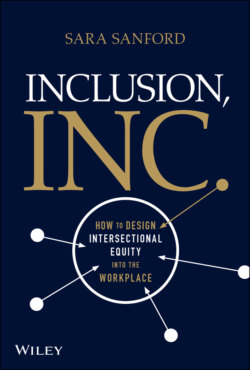Читать книгу Inclusion, Inc. - Sara Sanford - Страница 30
Notes
Оглавление1 1. The IAT measures the strength of unconscious associations between concepts (e.g., Black people, gay people) and evaluations (e.g., good, bad) or stereotypes (e.g., athletic, clumsy). The main idea is that responding is easier when closely related items share the same response key. “Implicit Association Test (IAT),” Project Implicit, 2011, https://implicit.harvard.edu/implicit/takeatest.html; “About the IAT,” Project Implicit, 2011, https://implicit.harvard.edu/implicit/iatdetails.html.
2 2. “From Love to Voting: Who Really Decides, You or Your Brain?” CBC DOCS, https://www.cbc.ca/natureofthings/features/my-brain-made-me-do-it-who-decides.
3 3. Linnea Dunne, “So You Think You Were Hired on Merit? Gender Quotas and the Perception Gap,” Linnea Dunne (blog), August 21, 2017, http://www.linneadunne.com/2017/08/21/think-hired-merit-gender-quotas-perception-gap/.
4 4. Shari Kendall and Deborah Tannen, “Gender and Language in the Workplace,” ed. Ruth Wodak, Gender and Discourse (1997): 81–105, https://time.com/wp-content/uploads/2017/06/d3375-genderandlanguageintheworkplace.pdf.
5 5. Susan C. Herring, “Gender and Participation in Computer-Mediated Linguistic Discourse” (paper, Annual Meeting of the Linguistic Society of America, Philadelphia, January 9–12, 1992), https://files.eric.ed.gov/fulltext/ED345552.pdf.
6 6. Janet Holmes, “Language Myth # 6: Women Talk Too Much,” PBS, 2005, http://www.pbs.org/speak/speech/prejudice/women/.
7 7. Iris Bohnet, What Works: Gender Equality by Design (Cambridge, MA: Belknap Press, an Imprint of Harvard University Press, 2016), 62–63.
8 8. Benjamin Artz, Amanda H. Goodall, and Andrew J. Oswald, “Do Women Ask?” Industrial Relations: A Journal of Economy and Society 57, no. 4 (2018): 611–636, https://onlinelibrary.wiley.com/doi/abs/10.1111/irel.12214.
9 9. Benjamin Artz, Amanda Goodall, and Andrew J. Oswald, “Research: Women Ask for Raises as Often as Men, but Are Less Likely to Get Them,” Harvard Business Review, June 25, 2018, https://hbr.org/2018/06/research-women-ask-for-raises-as-often-as-men-but-are-less-likely-to-get-them.
10 10. Morela Hernandez and Derek R. Avery, “Getting the Short End of the Stick: Racial Bias in Salary Negotiations,” MIT Sloan Management Review, June 15, 2016, https://sloanreview.mit.edu/article/getting-the-short-end-of-the-stick-racial-bias-in-salary-negotiations/.
11 11. Ashleigh Shelby Rosette, Christy Zhou Koval, Anyi Ma, and Robert Livingston, “Race Matters for Women Leaders: Intersectional Effects on Agentic Deficiencies and Penalties,” The Leadership Quarterly 27, no. 3 (2016): 429–445, https://doi.org/10.1016/j.leaqua.2016.01.008.
12 12. As measured by the percentage of Black women enrolled in college in relation to other race-gender groups. “Black Women Are Ranked the Most Educated Group by Race & Gender,” HBCU Buzz, March 4, 2014, https://hbcubuzz.com/2014/03/black-women-are-ranked-the-most-educated-group-by-race-gender/.
13 13. Zuhairah Washington and Laura Morgan Roberts, “Women of Color Get Less Support at Work. Here's How Managers Can Change That,” Harvard Business Review, March 4, 2019, https://hbr.org/2019/03/women-of-color-get-less-support-at-work-heres-how-managers-can-change-that.
14 14. “The State of Black Women in Corporate America” (LeanIn.Org and McKinsey & Company, 2020), https://media.sgff.io/sgff_r1eHetbDYb/2020-08-13/1597343917539/Lean_In_-_State_of_Black_Women_in_Corporate_America_Report_1.pdf.
15 15. Daniel A. Effron, Jessica S. Cameron, and Benoît Monin, “Endorsing Obama Licenses Favoring Whites,” Journal of Experimental Social Psychology 45, no. 3 (2009): 590–593, https://doi.org/10.1016/j.jesp.2009.02.001.
16 16. Carol Kulik, Molly Pepper, Loriann Roberson, and Sharon Parker, “The Rich Get Richer: Predicting Participation in Voluntary Diversity Training,” Journal of Organizational Behavior 28, no. 6 (2007): 753–769, https://www.researchgate.net/publication/227677080_The_rich_get_richer_Predicting_participation_in_voluntary_diversity_training.
17 17. Tessa L. Dover, Brenda Major, Cheryl R. Kaiser, “Members of High-Status Groups Are Threatened by Pro-Diversity Organizational Messages,” Journal of Experimental Social Psychology 62 (2016): 58–67, https://doi.org/10.1016/j.jesp.2015.10.006.
18 18. Tessa L. Dover, Brenda Major, and Cheryl R. Kaiser, “Diversity Policies Rarely Make Companies Fairer, and They Feel Threatening to White Men,” Harvard Business Review, January 4, 2016, https://hbr.org/2016/01/diversity-policies-dont-help-women-or-minorities-and-they-make-white-men-feel-threatened.
